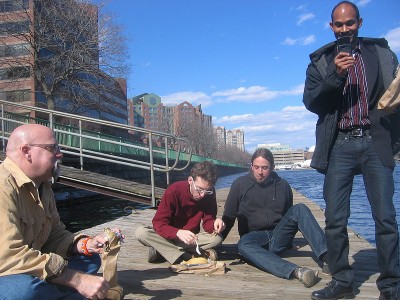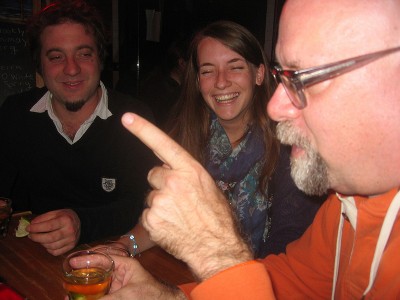Sol Computer, a California-based distributor that focuses on sunlight-readable technology, has a high-end line of rugged netbook laptops, is planning to sell a similar tablet for $950 later this year. It looks a lot like they are targeting an OLPC use case in the developed world — sunlight-readable, child- and abuse-friendly devices. Nice to know there is a market for that, and that it has discovered Pixel Qi.
Category Archives: Laptops
Nancie Severs on the recent OLPC Help Sprint!
Nancie wrote up her week visiting Boston to work on the updated Help activity, in her travel blog:
Last October at the San Francisco [OLPC] Volunteer Summit, plans for the Refresh-Help project evolved. This week in Boston, here we are! The details can be found on the wiki. Adam Holt (OLPC & Haiti), and volunteers Christoph Derndorfer (Vienna), George Hunt (engineering & School Server expert) Mark Battley (Toronto/Kenya), Craig Perue, (Jamaica), Laura de Reynal France/NosyKomba, Harriet V (India). Sandra Thaxter (MA/Kenya) Ed C (Indiana), Sameer (OLPC-SF & Jamaica), and locals Bernie, Dogie, SJ and others worked and played together at the Cambridge OLPC offices to try and get this project done! Chief organizer Caryl Bigenho was busy helping remotely most of the time. There were other folks around the globe furiously writing and editing too.
Thanks for all who helped out! We still need people to help finish packaging the result into a new Help.xo activity, and translate the result into Spanish.
Pixel Qi ships its 3 millionth display
Pixel Qi has shipped over 3 million displays in over fifteen laptop and tablet models; and XOs are becoming a minority of the worldwide usage of the robust low-power designs.
Their new displays continue to drop their power requirements; we would be able to save over half of the power our current displays draw by upgrading to the newest Qi design. I have always loved this best of all of the tech innovations in the XO, and am delighted to see it take off as its own force for constructive change.
IADB studies OLPC in Peru
The Inter American Development Bank recently published the results of a study of the Peruvian schools that received OLPCs in rural primary schools in Peru, over the first 15 months of the program.
The methodology of the study was quite good, with a randomized study of over 300 schools. But the measurements and focus were not aligned with the goals of Peru’s program, and there is no clear way to compare these results with the other detailed results available from Plan Ceibal’s program in Uruguay. The after-analysis of their work has tended to focus on short-term math and reading results, whereas the goals of the program were access to knowledge, improvements in pedagogy, and access to computing – which might be expected to show up in the short term only in the abstract cognitive results.
The measured improvement in abstract thinking – roughly 5 additional months of cognitive development, over a 15-month period – is tremendous. It is interesting to note how this result is downplayed in parts of the world where schools live by less abstract standardized testing.
Some recent comments from OLPC staff and implementers, paraphrased for brevity:
Claudia Urrea:
‘The OLPC program in Peru, or any other place, has to be evaluated according to its initial goal. “math, language, and cognitive test results” showed outputs, but have no clear connection to Peru’s 2007 stated objectives, which targeted pedagogical training and application.’
Oscar Becerra, who oversaw OLPC in Peru’s government:
‘We succeeded in giving access to technology to 100% (220,000) of children and teachers at one-teacher schools, who otherwise would have had no opportunity to use ICT. Most had the option to take laptops home with them.’
Oscar has published other comments that are a good representation of the OLPC perspective.
2012 Doc Sprint Begins
Many incredible volunteers are still on their way to Boston, sacrificing their Passover/Easter holiday weekend, for our April 6-10’s Doc Sprint. Officially starting Friday at OLPC HQ in Cambridge, Massachusetts!
The 5-day task is Huge. So was the marathon preparation. Our goal here, and now: to engage thousands more active users worldwide, of all ages, to understand the POWER of the XO laptop and its Sugar learning system — 4.5 full years after this global XO kids learning movement truly hit the road.
It’s time. And our community tools are all rapidly coming together to make this all happen — so our community’s priorities boil down to documenting:
- XO Hardware
- Core OS, Sugar & Gnome
- Sugar Activities
- Learning Tactics, School Server, Volunteer Community
Our driving goal? Refreshing our touchstone manual that first appeared way back in early autumn 2008. No, NOT another deployment guide or deployment gossip. But something succinct+snappy, dare we say approachable+fun? With dramatic changes in store…
In the end? The most cool Sugar Activities on every continent will make our best Chapters visible, just 1 click away, for Years To Come.
The amazing reality? Key documents (and videos) are already being slapped into shape, and interlinked in far more meaningful ways, and far beyond core manuals. Consider Walter Bender’s newly concise summaries of his 25 favorite Activities, real world server-in-field tricks emerging into the light — with new kinds of project-sparking videos imminent from implementation experts like Kenya’s Ntugi Group.
Don’t forget. You too CAN contribute, even from a distance, even just joining our team mailing list library@lists.laptop.org!
Thanks to all running this race for the ages! Especially Christoph Derndorfer, Caryl Bigenho, Seth Woodworth and Laura de Reynal for their most priceless prep 🙂
Delaware student builds English-to-Creole translator in Scratch for XOs
Eric McGinnis, a senior at U. Delaware, took part in a visit to Haiti earlier this month coordinated by his school, UNC Charlotte,  Waveplace, and Mothering Across Continents.  After taking a course in game development, he built an English-to-Creole translator in Scratch which he distributed to students at the Waveplace school.
The UDaily covered the trip and his project.


